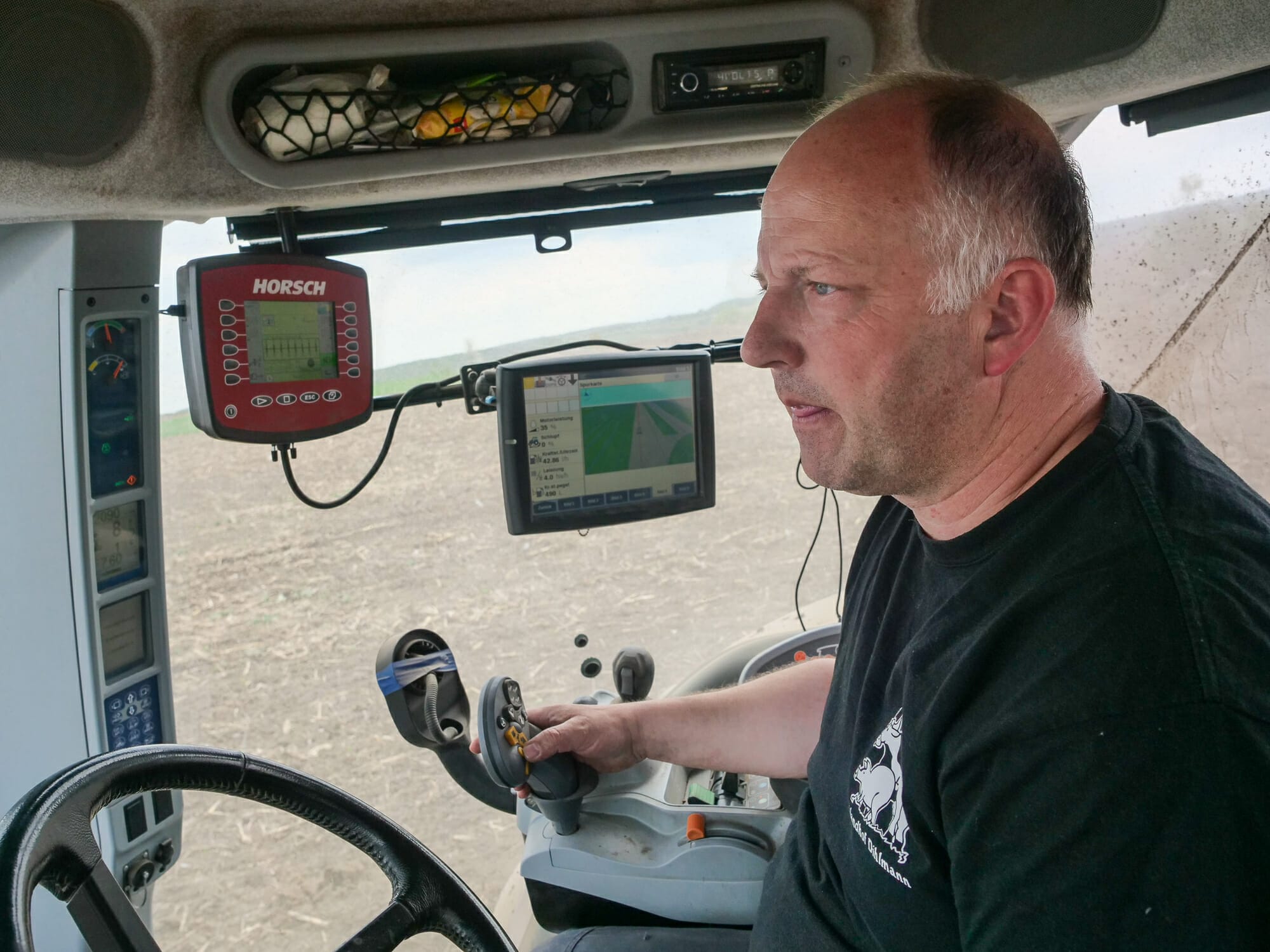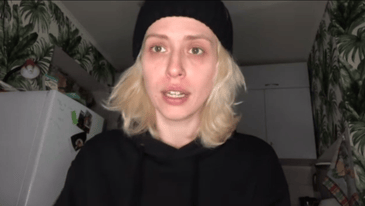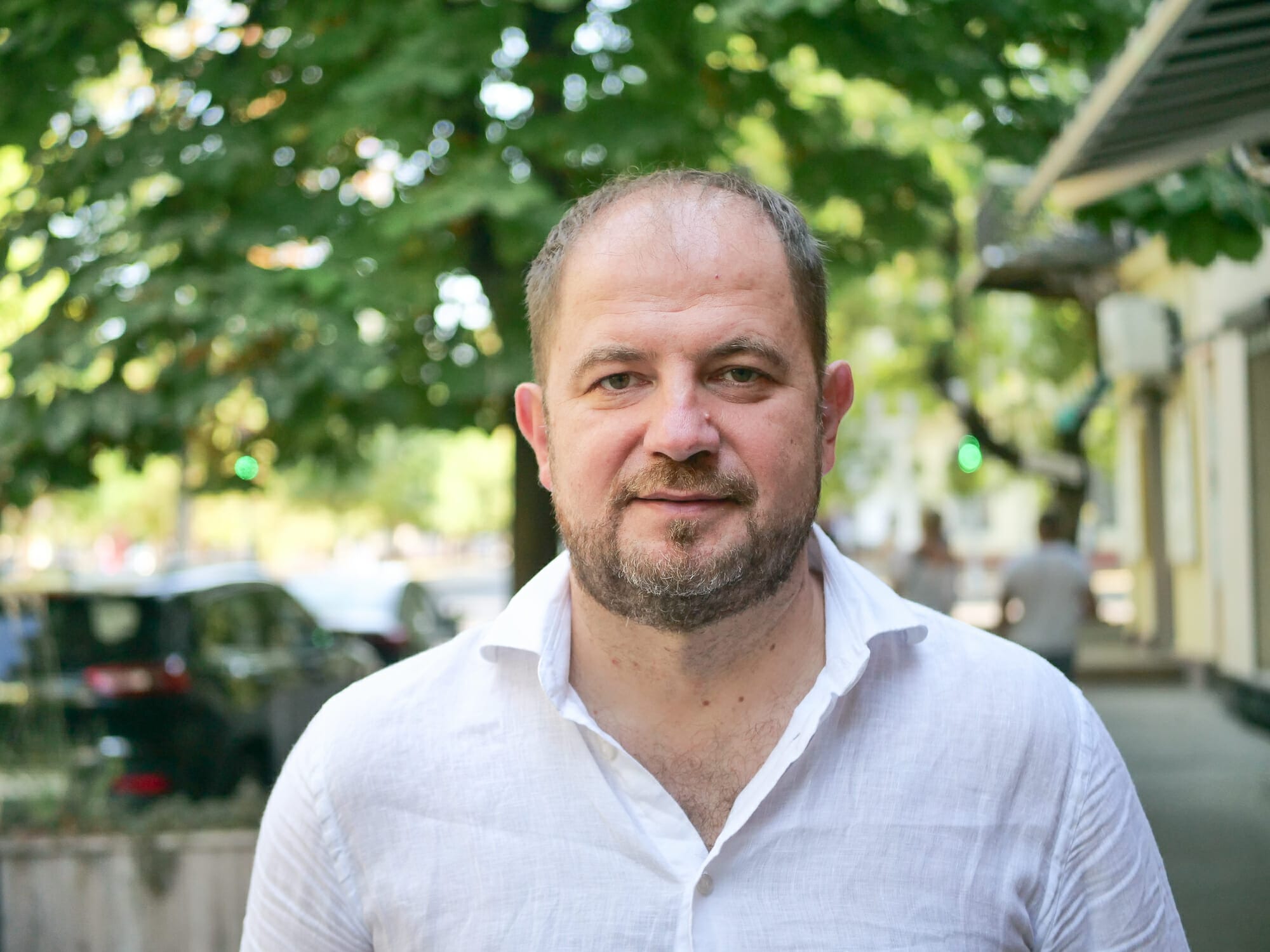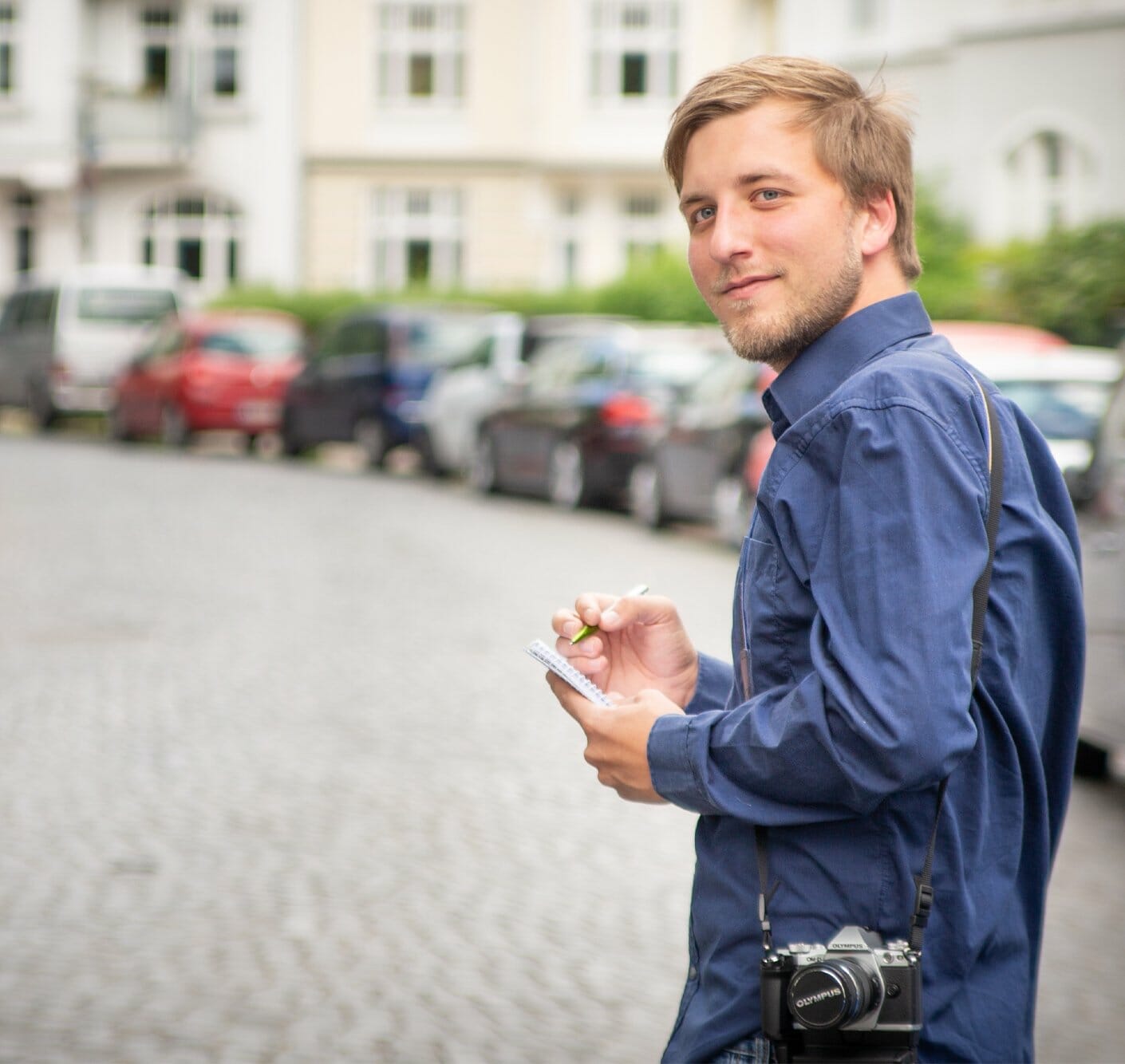Tatiana Ovays: IDP from Sievierodonetsk starts over in Vinnytsia
After two weeks of war, Tatiana Ovays fled Sievierodonetsk with her family. She had to start over in Vinnytsia, central Ukraine, and quickly gained a foothold.
Before the first question is asked, Tatiana Ovays pulls out her phone. She already knows that her escape from Sievierodonetsk will be the topic and she wants to give an impression of her city. The 48-year-old opens the Instagram page of the news channel LHS 1934 Severodonetsk.
Under the spell of images
She seems almost obsessive as she scrolls through the timeline for several minutes: burned out Balconies, shattered windows, smashed facades. Seeing her destroyed hometown from afar is obviously difficult for her – and still she cannot look away. “When there’s fighting, the fire department can’t come to help,” she notes.
The interview takes place in Vinnytsia at the beginning of May, long before Ukrainian and Russian troops engage in a bitter battle for the strategically important city. But even at this point, the extent of the destruction is significant and Ovays has long since left her home. In the city center there is even a temporary cemetery for the dead, says Ovays: “Only for civilians.”
15 days war
On March 7, 15 days after the start of the Russian major offensive, Ovays left Sievierodonetsk. “We were waiting for a moment when there wasn’t so much fighting,” she says. By then, Ovays managed nine mini markets in the region. While some employees no longer dared to come to work, she continued to do so even during the shelling. “The markets had to stay open and offer food and products because people were panicking and buying everything,” she says.

Getting the goods was the next challenge for her. The bread supplier, for example, was not available anymore: “Because of the fighting, the drivers could no longer come into the city.” So she drove off with her husband, picked up the bread herself and brought it to the different parts of the city. In the meantime, she did not want to seek refuge in bomb shelters. “When I was working, it was easier to understand and adapt to the situation,” says Ovays.
Curfew makes escape more difficult
When the right moment came, she fled with her family. Finding it, however, was not easy. “We often had to stop and wait again,” she says. On the one hand there was the fighting, on the other hand the curfew started at 5 p.m. Especially since thousands of people started moving and traffic jams further interrupted the flow of traffic.
On the first day, the family reached Sloviansk, about 80 kilometers away. “People we’ve never seen before just gave us their keys and food,” says Ovays, still surprised by the enormous willingness to help. She was also offered to stay longer in Sloviansk. But because of the riots here in 2014, she aimed for the west of the country. “First we wanted to go to the Lviv region,” says Ovays.
Only one route leads to safety
But until then there was still a long way of more than 1000 kilometers to go when they set off from Sloviansk the next morning. “There were more than 240 kilometers of traffic jams,” says the 48-year-old, describing the masses of cars that were moving at the time; whereas the length is hardly verifiable. Because the only route from the Donetsk region led through Dnipro. Going north to Kharkiv was not an option because of the bombing there. At an average of 20 kilometers per hour, they only made progress because military checkpoints also slowed down the flow of traffic. “It was impossible to drive faster,” she recalls.
In Dnipro, however, Ovays and her family were turned away because the city was bombed upon arrival. “They didn’t let us in,” she says, still incredulous. Once again, strangers then have offered a place to sleep nearby.
They left the accomodation around noon and found a woman who needed help: “She had a car but no driver.” She simply wanted to go to Lviv. When she found a bus to western Ukraine for herself and the three children, she rejected the idea and preferred this solution.
Helpfulness leads to the next dilemma
This amount of time meant the next dilemma for Ovays and her family: When they arrived in Kropyvnytsky in the evening, they were turned away again. The curfew was in effect from 7 p.m. “We arrived in Uman at 11 p.m. and weren’t allowed in either,” she says. They couldn’t even go into town to buy water or go to the toilet. There were consistently long queues at the gas stations along the route. Her 26-year-old daughter had panicked after not leaving the apartment in Sievierodonetsk for two weeks: “She was afraid of being killed.”
She finally found a hostess late at night via an app in which helpful people offer places to sleep. “I didn’t want to call anyone at that hour,” she notes. But this woman responded to her message and invited Ovays directly. Everything she could use to verify herself in advance was her Instagram account. That was enough pre-information for the hostess. “Yulia is still helping people who are fleeing from other regions,” says Ovays enthusiastically.
Search for accomodation
After a total of around 18 hours drive, they finally arrived at 5:30 a.m. in Vinnytsia, 570 kilometers from Dnipro. “We waited half an hour because I was a bit ashamed,” she says. But when tiredness got the better of her, she dialed Yulia’s number – who answered immediately and invited the family to come inside. A room with a sofa and mattresses on the floor offered the family of four with a dog a place to sleep.
Two days of looking for an apartment were initially unsuccessful. “Everything was booked,” says Ovays. After staying in a hostel, they then moved to a school that served as a reception center. “But my granddaughter is still young,” she notes. Such temporary housing is acceptable for adults in this situation, but she wanted a better place for the children. After one night, her daughter also decided to leave the place the following day.
Through an acquaintance, Ovays’ son-in-law finally found the offer from a family who lives in Khmelnytskyi, around 40 kilometers from Vinnytsia. “They didn’t have room for everyone, but they took my daughter and my granddaughter,” she says. This enabled the 48-year-old and her husband to look for a smaller apartment.
By chance to the own apartment
Then, while walking the dog in the morning, she met a woman who offered to help and referred Ovays to an aid organization. When she was on her way to her daughter, the good news came: she could get a one-room apartment. It should cost 4,000 hryvnia, around 130 euros, per month. Ovays agreed immediately. But having arrived in Khmelnytskyi another surprise followed. Because her daughter only had a bed in a connecting room, relatives of the host family from Mariupol and Kharkiv lived in other rooms. “I told her: You can come to Vinnytsia with us and live in the one-room apartment,” says Ovays. At least that’s how the family would be together. The daughter accepted the offer.
The four lived together for a month in the apartment, for which the rent had to be paid weekly; in case the family moves on. “Then we put our daughter and granddaughter on the bus to the Czech Republic,” Ovays continues – because rockets have also hit Vinnytsia in the meantime. They woke up again at night because of the impact: “It’s better for the child to be in Europe because there are no sirens and no bombs.” She herself decided against fleeing abroad to stay with her husband. Especially since her parents are 80 years old and initially did not want to leave Sievierodonetsk. In the meantime they have also come to Vinnytsia.
Fast arrival
Meanwhile, Ovays was able to quickly gut used to her new home. “The city is beautiful and the people are nice,” she says: “When we came into the apartment, we had nothing: no dishes, no bed – really nothing.” First, she introduced herself to the neighbors so that they would not be surprised by the strangers. “There was a sign at the entrance from to inform the facility management if strangers showed up,” she notes. Within 30 minutes, the neighbors organized everything necessary. “Dishes, spoons, soups, jam, pillows – they just collected for us,” says the 48-year-old, visibly touched. This made her feel like having “arrived” on the first day.
In the meantime, she has also found a bigger accomodation and lives with her parents in a three-room apartment. Thanks to local support, they didn’t pay an inflated price. She has now found work. “I went to every mini market, offered to work as a saleswoman and left my phone number there,” she says. But in vain. Nobody wants to hire a 48-year-old anymore.
New workspace
She then met Svetlana by chance, who fled to Vinnytsia in 2014 from the war in Donetsk and was now registering other internally displaced persons for financial aid for a UN organization. She suggested Ovays as a work colleague. “We talk to people and listen to them. I understand what they are telling me – I understand the horror they have experienced,” Ovays sees herself at the right place in her new job.
Even though she quickly built a new life for herself in Vinnytsia, she is certain: “I want to go back home and build it up.” At almost 50, she can no longer imagine leaving the country like her daughter, learning a new language. “I hope this is good for her,” Ovays notes.
Difficult contacts
The relationship with her husband’s family is significantly worse. The father-in-law lives in Russia and was “brainwashed”. “My husband told him that Russia was attacking us and he said: ‘Don’t you understand that they are coming to free you?’” He also offered to take the family to Russia; her son and son-in-law are themselves in the Ukrainian military. Then they cut off contact. “The bombs are flying over us,” she emphasizes. As a Russian native speaker, she is now trying to switch to Ukrainian. “I traveled all over Ukraine until Uzhhorod – nobody ever oppressed us,” she says. But after the victory, a wall is needed between Ukraine and Russia.
In the meantime, she doesn’t know where her son and son-in-law are. “We get a message every three days that they are still alive,” says Ovays. In the first days of the war, the connection was completely broken, she was without any information: “I went to church, stood there crying.” She prayed to God that she would stay alive.
Vorgeschlagene Beiträge

Why foreign farmers are coming back to Ukraine

Juli Karzanova reports from Chernihiv: “We are dying here: for no reason at all”

Vadym Tereshchuk: Views of a Ukrainian local politician
[mc4wp_form id=239488]


Leave a Reply
You must be logged in to post a comment.